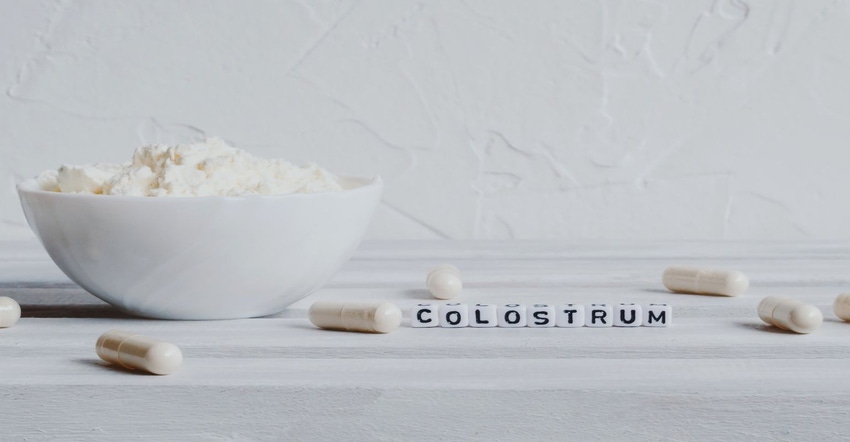Clinical research supports the potential of colostrum as a novel sports nutrition functional ingredient, with additional benefits ranging immune to digestive health.
September 6, 2022

The U.S. sports nutrition market is expected to reach $17.8 billion by 2024, according to Nutrition Business Journal’s 2019 Supplement Business Report. With sports nutrition becoming more mainstream among athletes of all abilities and stages of competition, the demand for protein-based products is on the rise.
Novel sports nutrition ingredients are entering the market, offering manufacturers of dietary supplements—as well as functional food and beverage—the opportunity to develop new and improved protein-based combination products that go above and beyond simply providing a source of essential amino acids (EAAs). These ingredients provide health and physical performance benefits that pair nicely with the nutritive benefits of protein supplements.
However, many of today’s protein brands don’t address possible depressed immunity or increased risk of gut permeability associated with rigorous training. Studies have reported significant impacts of intense training sessions on the susceptibility to illness, and intestinal leakiness which can lead to increased systemic inflammation, poor absorption of amino acids and nutrients, and gastro-intestinal distress and motility issues.1,2
Colostrum, a novel sports nutrition ingredient, can help athletes by supporting the integrity of the gut lining, increasing muscle mass, improving second-bout exercise performance, providing advanced immune support, and reducing exercise-induced muscle damage.3
Functional ingredient for sports nutrition
Colostrum is a functional ingredient for supplements, functional foods and beverages, and can be formulated with protein powders to give these products an added functional boost. Colostrum obtained from dairy cows within the first day of milking after calving is highly enriched in protein, vitamins, minerals and many bioactive components. Colostrum’s unique composition makes it a powerful addition to any sports nutrition regimen, as it provides:
• Growth factors to assist in cellular proliferation and restitution, which is especially important in supporting intestinal barrier integrity that can become compromised following vigorous training sessions.
• Immunoglobulins to support the immune system during athletic training.
• Immune factors like lactoferrin, lysozyme and lactoperoxidase, which have inherent antimicrobial activities to support the immune system while under the physiological stress of physical training.
• Complex oligosaccharides to feed the beneficial microbiota in the intestine and improve the gut microbiome, which can be negatively impacted by intense training sessions.
Clinical research
For decades, clinical research has demonstrated the positive effect of colostrum on several different aspects of optimal health and well-being in athletes. These studies support the potentially protective role of colostrum in athletes on gut barrier integrity, muscle growth and strength, athletic performance, and immune function during training.
Gut permeability
During intense exercise or training sessions, the cells lining the intestinal wall have reduced perfusion, or blood flow, which may cause damage due to lack of oxygen and other nutrients.4 Additionally, once the training session is over, the blood that was shifted toward the muscles and the periphery to help with heat management is then shuttled back to the intestines in a rapid fashion, causing further injury to the intestinal epithelium.
In a double-blind, placebo-controlled trial, colostrum supplementation for 20 days decreased intestinal permeability in a group of mixed athletes from different sport disciplines (MMA, triathlon, cycling, water polo).5 These athletes had high baseline intestinal permeability, and colostrum was more effective than the placebo (whey protein) in improving gut barrier integrity.
In another study, healthy volunteers were supplemented with colostrum for two weeks prior to a vigorous exercise session that lasted for 20 minutes at 80% of VO2 max.6 Following the intense exercise, markers of intestinal permeability were 80% lower in the colostrum-supplemented group as compared to the placebo group.
Growth and maintenance of muscle
Optimal gut barrier integrity leads to better absorption of nutrients including amino acids, which are important in reaping the benefits of athletic training on muscle gains and maintenance. Thus, it is no surprise that colostrum has been clinically shown to support muscle mass, mitigate muscle damage and enhance strength. In a randomized controlled trial (RCT) with healthy adult men and women undergoing regular resistance training, supplementation with colostrum for eight weeks significantly increased lean body mass (LBM) as measured by DEXA (dual-energy x-ray absorptiometry) scans over individual baseline LBM at the start of the trial.7
In another RCT, the combination of colostrum with whey and casein protein was consumed by resistance-trained adults over a span of 12 weeks during a resistance training program.8 The combination was more effective in increasing LBM as measured by DEXA than the whey and casein protein only control. This study highlights the potential power of a combination protein plus colostrum supplement.
Of note, these effects are not likely due to the growth factors in colostrum. Consumption of high levels of colostrum have been shown to have no impact on blood levels of insulin-like growth factor, a key growth factor present in colostrum.9 This is of particular interest to athletes who must adhere to the World Anti-Doping Agency (WADA) code and prohibited list of substances. In support of these results on LBM, another RCT showed significantly lower levels of biomarkers related to muscle damage in soccer players who consumed colostrum over a six-week period compared to those who consumed a whey protein concentrate control.10 This study suggests that colostrum’s effect on muscle mass may be in part due to mitigating muscle catabolism.
Athletic performance
Given the effects of colostrum on gut barrier integrity and lean body mass in those undergoing training, it is logical that a positive impact on physical performance would follow. In the aforementioned RCT in soccer players, those who consumed colostrum had a significant increase in squat jump and countermovement jump height after the six-week trial period compared to the whey protein control group.10 In another RCT, trained cyclists who were supplemented with colostrum performed significantly better than controls (whey protein concentrate supplementation) in a workload time trial which involved cycling for two hours at a 65% maximum heart rate.11 In two other RCTs in men already undergoing regular physical activity, colostrum supplementation significantly improved peak anerobic cycling power and second-bout running performance (indicating better recovery from the first run) as compared to the control group (whey protein concentrate).12,13
Immune support during training
Immune system support is one of the better-known health benefits of colostrum. Several clinical trials have demonstrated this benefit specifically in athletes. A complete meta-analysis of studies with adult participants undergoing exercise training was reported by Jones et al., where the measures included days with upper respiratory tract infections (URTIs) and total episodes of URTIs during colostrum or placebo consumption.14 These studies had participants undergoing a wide range of training, including running, swimming, cycling and general cardio and weight training and colostrum supplementation from eight to 12 weeks. The pooled analyses reported in the meta-analysis revealed a consistent effect across the studies of colostrum supplementation on reducing days with URTI symptoms, as well as total number of URTI episodes in these active adults compared to placebo control groups.
The established benefits of colostrum for athletes and active adults range from supporting LBM, strength, physical performance and intestinal barrier integrity to immune health. Skim colostrum is particularly high in protein (60-80% protein content) and is rich in EAAs, making it a great on its own or paired with a protein powder supplement, shake or meal replacement. This combination provides sports nutrition enthusiasts with a boosted blend aimed at supplying key levels of amino acids for muscle repair and growth, on top of the added benefits of colostrum as a novel sports nutrition functional ingredient.
With more than 15 years of commercial experience, Mike Weiser, Ph.D., was formerly the senior R&D and innovation director at PanTheryx, where he drove the development of new bovine colostrum ingredient forms and new product application formats for consumers in all stages of life. Weiser has authored more than 25 peer-reviewed publications and is an inventor on several patents on nutritional products for human health.
References
1 De Oliveira EP et al. "Gastrointestinal complaints during exercise: prevalence, etiology, and nutritional recommendations." Sports Med. 2014;44(Suppl 1):79-85.
2 Nieman DC. "Marathon training and immune function." Sports Med. 2007;37(4):412-415.
3 Davison G. "The use of bovine colostrum in sport and exercise." Nutrients. 2021;13(6):1789.
4 Van Wijck K et al. "Exercise-induced splanchnic hypoperfusion results in gut dysfunction in healthy men." PloS one. 2011;6(7): e22366.
5 Hałasa M et al. "Oral supplementation with bovine colostrum decreases intestinal permeability and stool concentrations of zonulin in athletes." Nutrients. 2017;9(4):370.
6 Marchbank T et al. "The nutriceutical bovine colostrum truncates the increase in gut permeability caused by heavy exercise in athletes." Am J Physiol Gastrointest Liver Physiol. 2011;300(3):G477-G484.
7 Antonio J et al. "The effects of bovine colostrum supplementation on body composition and exercise performance in active men and women." Nutrition. 2011;17(3):243-247.
8 Kerksick CM et al. "Impact of differing protein sources and a creatine containing nutritional formula after 12 weeks of resistance training." Nutrition. 2007;23(9):647-656.
9 Davison G et al. "Oral bovine colostrum supplementation does not increase circulating insulin-like growth factor-1 concentration in healthy adults: Results from short-and long-term administration studies." Eur J Nutr. 2020;59(4):1473-1479.
10 Kotsis Y et al. "A low-dose, 6-week bovine colostrum supplementation maintains performance and attenuates inflammatory indices following a Loughborough Intermittent Shuttle Test in soccer players." Eur J Nutr. 2018;57(3):1181-1195.
11 Coombes JS et al. "Dose effects of oral bovine colostrum on physical work capacity in cyclists." Med Sci Sports Exerc. 2002;34(7):1184-1188.
12 Buckley JD et al. "Bovine colostrum supplementation during endurance running training improves recovery, but not performance." J Sci Med Sport. 2002;5(2):65-79.
13 Brinkworth GD et al. "Concentrated bovine colostrum protein supplementation reduces the incidence of self-reported symptoms of upper respiratory tract infection in adult males." Eur J Nutr. 2003;42(4):228-232.
14 Jones AW et al. "Bovine colostrum supplementation and upper respiratory symptoms during exercise training: a systematic review and meta-analysis of randomised controlled trials." BMC Sports Sci Med Rehabil. 2016;8(1):1-10.
About the Author(s)
You May Also Like






.png?width=800&auto=webp&quality=80&disable=upscale)